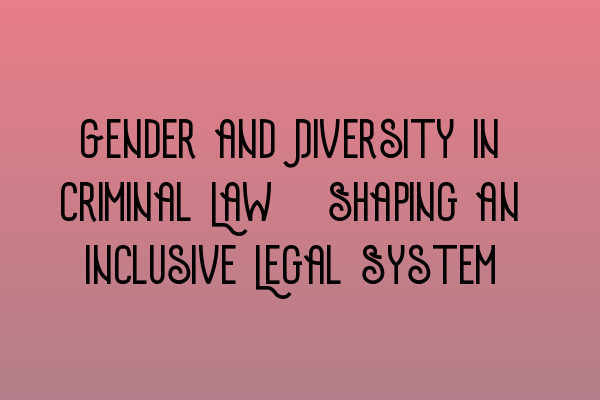Gender and Diversity in Criminal Law: Shaping an Inclusive Legal System
Welcome to the SQE Criminal Law & Practice Law UK blog. In this article, we will explore the important topic of gender and diversity in criminal law, and how it plays a crucial role in shaping an inclusive legal system.
The Importance of Gender and Diversity
Gender and diversity are fundamental aspects that need to be addressed in criminal law to ensure fair and just outcomes for all individuals involved. It is essential to have diverse representation within the legal profession to better serve the diverse needs of the community.
To start, it is crucial to understand the different ways gender and diversity can impact criminal law:
Inclusive Legal System:
An inclusive legal system ensures that all individuals, regardless of their gender or background, have equal access to justice. It promotes fairness, eliminates bias, and upholds the principles of equality, which are the foundation of a just society.
Representation and Perspectives:
Having a diverse legal profession allows for the representation of different perspectives and lived experiences. It is essential to have lawyers and solicitors from various backgrounds, including gender, ethnicity, and socio-economic status, to better understand the complexities of different cases and provide comprehensive legal support.
Addressing Bias and Stereotypes:
Gender and diversity play a crucial role in challenging biases and stereotypes that exist within the criminal justice system. By broadening the perspectives and representation within the legal profession, we can work towards dismantling discriminatory practices and ensuring fair treatment for all individuals.
Steps Towards an Inclusive Legal System
To create an inclusive legal system, it is essential for legal professionals and institutions to take the following steps:
Educational Initiatives:
Educational initiatives should be developed to promote diversity and inclusion within the legal profession. This includes creating programs and scholarships that support underrepresented groups and ensuring diversity is included in legal curricula.
Promoting Equal Opportunity:
Law firms and legal organizations must actively promote equal opportunity policies that encourage diversity in recruitment, hiring, and promotions. Addressing systemic barriers and fostering an inclusive work environment is crucial in creating a more diverse legal profession.
Training and Sensitization:
Legal practitioners should receive training and sensitization on issues related to gender and diversity. This will help raise awareness of biases and stereotypes and equip professionals with the necessary tools to address them effectively.
Engaging Stakeholders:
It is important to engage with stakeholders, including community organizations, activists, and individuals with lived experiences, to better understand the challenges faced by marginalized groups and to work together towards creating an inclusive legal system.
Conclusion
The journey towards an inclusive legal system requires continuous efforts from legal professionals, institutions, and society at large. By addressing and incorporating gender and diversity considerations into criminal law, we can ensure a fair and just legal system that serves the needs of all individuals.
If you found this article helpful, please check out our related content:
- SQE Exam Prep: Essential Study Materials for Aspiring Solicitors
- Expert Testimonies in UK Courts: Building Strong Cases
- Demystifying the Solicitors Qualifying Examination Format
- SQE Exam for International Lawyers: Challenges and Success Strategies
- LLC Formation Made Simple: Step-by-Step Guide for UK Entrepreneurs
